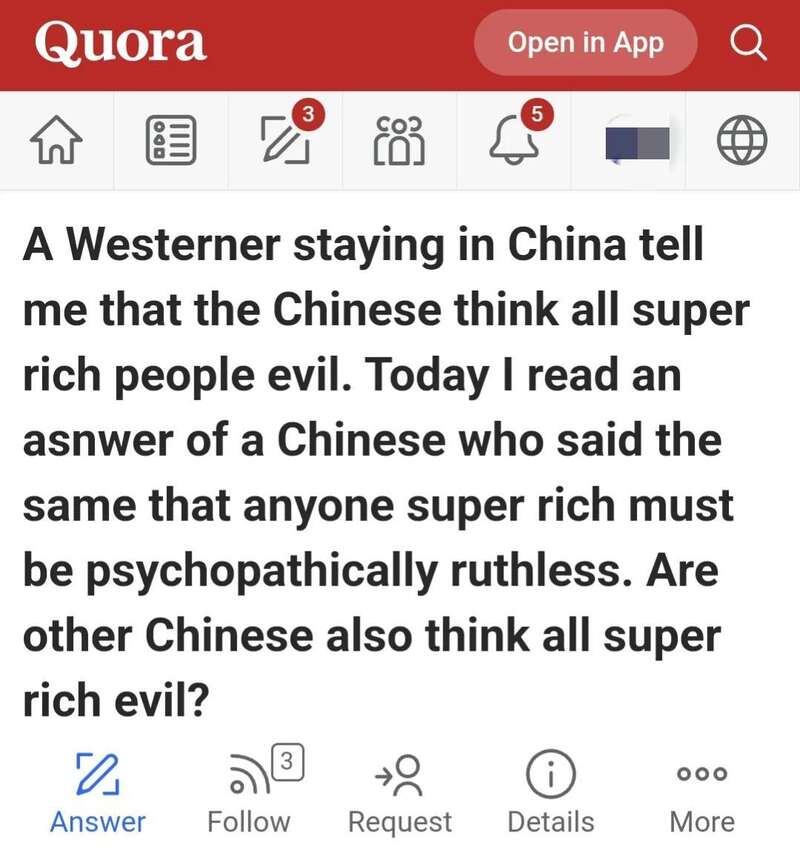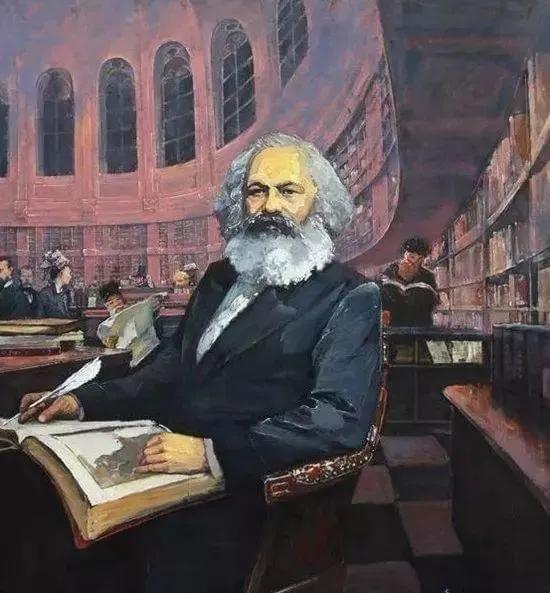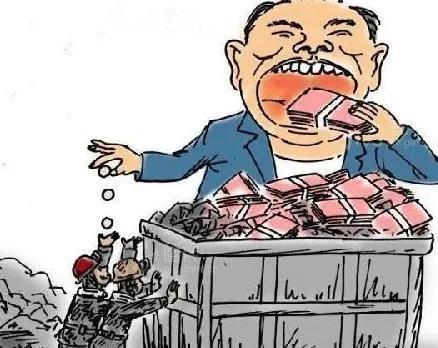 问题
问题
中国网友Li Pengii的回答
You've got it wrong. This is because most Westerners have not studied Das Kapital and the related communist theory.
你的理解错了。这是因为大多数西方人没有研究过《资本论》和相关的共产主义理论。
As "people," the rich are no different from other ordinary people, but "capital" is evil. The rich are the embodiment and personification of capital.
作为“人”,富人与其他普通人没有什么不同,但“资本”是邪恶的。富人是资本的化身和人格化。

The essence of capital is to increase in value, and it will do whatever it takes to achieve that goal. This is also the true meaning of "capitalists can sell ropes to hang themselves" in the Communist Manifesto. Capitalists are just the puppets of capital, the agents of capital in the world.
资本的本质是不断增值,为了实现这一目标,资本会不惜一切代价。这也是《共产党宣言》中“资本家可以卖绳子上吊”的真谛。资本家只是资本的傀儡,是资本在世界上的代理人。
Chinese respect wealth, but Chinese are very wary of capital, please note that "wealth" and "capital" are different. "Wealth" allows you to live a happy life, while "capital" exploits and squeezes the entire society.
中国人尊重财富,但中国人对资本非常警惕,请注意“财富”和“资本”是不同的。“财富”让你过上幸福的生活,而“资本”则剥削和挤压整个社会。
Of course, capital can not be eliminated, the existence of capital has its necessity and rationality, but we must be vigilant and control capital. This is the essential difference between "capitalism" and "socialism".
当然,资本是不能消灭的,资本的存在有其必要性和合理性,但我们必须警惕和控制资本。这也是“资本主义”和“社会主义”的本质区别。
Let me add some history to illustrate China's attitude to capital.
让我补充一些历史来说明中国对资本的态度。
China does not deny the existence and importance of capital. Both enterprises and countries cannot develop without capital. The key is how to control capital.
中国并不否认资本的存在和重要性。无论是企业还是国家,发展都离不开资本。关键是如何控制资本。
Firstly, the existence of socialist political power must be guaranteed.
可以简单理解为:第一,必须保证社会主义国家政权的存在。
Political development has become stable. There must be a shift towards economic construction and a more flexible approach to capital and markets. This stage is to make socialist countries rich.
政治建设趋稳。必须转向经济建设,更加灵活地面对资本和市场。这个阶段是:使社会主义国家富裕起来。
Even so, China remains wary of the power of capital, and the process of cooperation has not been smooth. If you know Chinese history, you should know that in the 1980s and 1990s, China went through several twists and turns.
即便如此,中国仍然对资本的力量非常警惕,合作的过程也不是一帆风顺的。如果你了解中国历史,你应该知道,在20世纪80年代和90年代,中国经历了几次曲折。
He knows very well what to do for the development of the country, but in his life cycle, he can only do the most important things. China calls this "historical limitation" and "historical inevitability".
他非常清楚为国家发展做些什么,但在他的生命周期中,他只能做最重要的事情。中国称之为“历史局限”和“历史必然性”。
Even today, China is by no means a capitalist country. This is the principle they have always followed. To use a relatively shallow but simple explanation: in some Western countries, such as the United States, politicians are slaves and agents of capital, and they obey the rules of big capital. But in China, capital is subordinate to the needs of social development. If capital crosses the line, it will take a hit.
即使在今天,中国也绝非一个资本主义国家,这是他们一直遵循的原则。用一个相对肤浅但简单的解释:在美国等一些西方国家,政治家是资本的奴隶和代理人,他们服从大资本的规则。但在中国,资本服从社会发展的需要。如果资本越过这条线,它将受到打击。

德国网友派特的回答
Capital was dripping with blood from head to toe, blood and dirt in every pore. -- Karl Marx
资本从头到脚滴着血,每个毛孔里都是血和土。——马克思

Do other Chinese also think that all the super-rich are evil? Yes, yes!
其他中国人也认为所有超级富豪都是邪恶的吗? 是的,是的!
All you have to think about is this: humans are here on Earth. Land, minerals, animals, all kinds of resources and all kinds of things can be wealth, and everyone is free. From the start, these resources don't have someone's name on them. How do people decide who gets how much?
你只需要思考一下:人类来到了地球。土地,矿产,动物,各种各样的资源和各种各样的东西都可以成为财富,每个人都是自由的。从一开始,这些资源就没有写某人的名字。人们如何决定谁得到多少?
Do you work?
工作吗?
Slaves work harder than slave owners. Sweatshop kids work harder than Wall Street bosses
奴隶比奴隶主勤奋得多,血汗工厂的孩子比华尔街老板勤奋得多
Wisdom?
智慧?
I don't see Einstein becoming the richest man in the world, Trump telling people to drink disinfectant while he has billions of dollars in assets, his daughter doesn't have to worry about tuition and living expenses and can enjoy the best education and schools from birth.
我没有看到爱因斯坦成为世界首富,特朗普告诉人们喝消毒液却坐拥亿万资产,他的女儿不用担心学费和生活费,一出生就可以享受最好的教育和学校。
Is it fortune?
运气吗?
Even if you gain wealth through luck, how do you keep it?
即使你靠运气获得财富,你如何保持住它?
Construction workers, miners and designers worked together to build a building. Are they paying enough to buy the building, and can they get the follow-on revenue that the building generates?
建筑工人、矿工和设计师一起建造了一座大楼。他们是否支付了足够的钱来购买这栋楼,他们能否获得这栋楼产生的后续收入?
Why do these workers get less in return than the benefits they create? Why do capitalists get this benefit? Why are such institutions and rules established and maintained by the law, the police, the prisons, the state and other violent departments?
为什么这些工作的人得到的回报比他们创造的利益要少?为什么资本家能得到这样的好处?为什么这样的制度和规则是由法律、警察、监狱、州和其他暴力部门建立和维护的?
The only answer is: violence, aggression, colonial rule, enslavement - these are the bloody primitive accumulation of capital that accumulated the initial wealth of modern capitalism and provided the physical environment and institutional foundation for the emergence of the super-rich later on.
唯一的答案是:暴力、侵略、殖民统治、奴役——这些都是血腥的资本原始积累,为现代资本主义积累了最初的财富,为后来超级富豪的出现提供了物质环境和制度基础。

You were born to have a good education, health care, peace, and to live on land built by plunder. But do you really think: "I don't own slaves, so I'm not responsible for it, and I've earned everything through my own efforts?"
你们生来就应该享受良好的教育、医疗、和平的环境,生活在掠夺来的财富建立起来的土地上。但你真的会想:“我没有奴隶,所以我不需要为它负责,我的一切都是通过我自己的努力得来的?”
Kids in ruins in the Middle East, kids starving in Africa, kids in brothels in Southeast Asia, working just as hard as you
那些在中东废墟中的孩子,那些在非洲挨饿的孩子,那些在东南亚妓院里的孩子,也和你一样“努力工作”
Can they be like you?
他们可以像你一样吗?
If hard work and intelligence can make you super rich, then the richest man in the world should be Einstein and his grinding donkey.
如果勤奋和智慧能让你成为超级富翁,那么世界上最富有的人应该是爱因斯坦和他那拉磨的驴。
 海外网友拉里的回答
海外网友拉里的回答I know Westerners respect wealth. But this is not the case with the Chinese. It has been so since ancient times. This is nothing new.
我知道西方人尊重财富。但中国人并非如此,自古以来就是如此,这不是什么新鲜事。
Today's Chinese seek wealth, but few respect it. It sounds like a paradox, but it's a reality.
今天的中国人追求财富,但很少有人尊重财富。这听起来像是一个悖论,但这是现实。
The Chinese are eager to get rich because we fear the return of the extreme poverty that left us less than a decade ago. Today's world is ruled by capitalism. Capitalism respects the rich, even to a very extreme degree. Many attribute the rapid growth to the overt or covert introduction of capitalism into the Chinese economy. The existence of capitalism has spurred Chinese people to pursue wealth by hook or by crook in some cases. So it is not surprising that the Chinese are hostile to those who got rich in the first wave of welcoming capitalism.
中国人急于致富,因为我们害怕刚刚离开我们不到十年的极端贫困再次回来。今天的世界是由资本主义统治的。资本主义尊重富人,甚至到了非常极端的程度。许多人将快速增长归因于将资本主义或明或暗地引入中国经济。资本主义的存在刺激着中国人在某些情况下不择手段地追求富裕。因此,中国人对那些在第一波欢迎资本主义浪潮中致富的人怀有敌意也就不足为奇了。
The rich who emerged in the second and third waves enjoyed better circumstances, and some of them were seen as role models for young people. But the rich show little interest in helping ordinary people get rich together, which is supposed to be their route to "collective prosperity".
在第二波和第三波中出现的富人享有更好的环境,他们中的一些人被视为年轻人的榜样。但是,富人对帮助普通人共同致富却没有多大兴趣,而致富本应是他们实现“集体富裕”的途径。
In traditional Chinese culture, being rich is considered a sin. By "rich" I mean rich through business. Because the sages of old thought that business would bring no new "value" to the world. Farmers and agriculture are seen as the foundation of a nation. If a businessman is rich, he must take the profits of others, because he does not create "value". The richer he gets, the more he exploits others. As a result, the merchant class has been disrespected for centuries.
中国传统文化认为富有是一种罪过。这里的“富”特指通过商业致富。因为古代圣贤认为商业不会给世界带来新的“价值”。农民和农业被视为一个国家的基石。如果一个商人发财了,他一定占有了别人的利润,因为他没有创造“价值”。他越富有,就越剥削别人。因此,商人阶层数百年来一直不受尊重。
There are many millionaires in China today, but only a few are respected. Many, if not all, of them are thought to have made "dark money". The most recent example is Jack Ma. He used to enjoy a good reputation. But his "innovation" in finance did ensnare many young people in the "innovation" loan system.
今天中国有很多百万富翁,但只有少数人受人尊敬。他们中的许多人(如果不是全部的话)都被认为赚了“黑钱”。最近的例子是马云。他过去享有很好的声誉。但他在金融领域的“创新”确实让许多年轻人陷入了“创新”贷款体系的陷阱。

中国网友陈文祥的回答
Some Chinese people have a strong hatred for the rich, and they have a strong hatred for the rich. In history, many peasant uprisings were acts of hatred against the rich.
部分中国人是有一种较强的仇富心理,而且是有很强的仇富心理,从历史上看农民起义不少就是仇富的行动、均田地平穷富、打土豪分田地,就是仇富心理。
In order for the new China to become strong and prosperous, not to be invaded and enslaved by foreigners, not to be bullied by domestic reactionary bullies, to raise the ideological and moral awareness of Party members and the people through the "Three Anti-Five" movement, the sons and women of the Chinese people fully invested in China's industrial power and rural mechanization transformation, to live a safe and happy life, the master, selfless dedication of their own.
刚解放一穷二白的农业国,为了新中国强盛不受外国人的侵略和奴役,不受国内反动恶霸行为的欺凌,通过"三反五反"运动提高党员和人民思想道德觉悟,中华儿女全身投入中国工业化强国和农村机械化改造,过上平平安安幸福生活的曰子,忘我无私奉献自己一切。
Since the reform and opening up, China has taken finance. High-tech, more advanced industrialization for China to a higher level as the center, a lot of scientific and technical personnel. Scientists, agricultural science and technology personnel, financial experts for the happiness of the Chinese people and the country strong people rich, this kind of people rich no one will hate rich them, because of labor and rich, for the benefit of the people, for the country to win glory and strong add rich.
改革开放以来,中国以金融.高科技,工业化更先进为中国更上一层楼为中心,很多科学技术人员.科学家、农业科技人员,金融专家为中国人民幸福和国强民富呕心沥血,这种人富起来没有人会仇富他们,因为劳动而富,为民造福,为国争光争强大添富。

However, on the way to reform the country, in order to make the country strong, many people gave everything they had, no savings, no property, hardships and hard work for decades. Laid-off, the poor step down to make way for the future generation of aspiring youth to develop their ideals to play a greater role in promoting high-tech, high-speed information construction of the powerful industrialization system and financial system, so that China strong stand on the world stage, these heroes rich Chinese people how can hate rich them. Even the laid-off poor don't hate the rich.
然而改革路上为了国家,为了让国家强大很多上辈百姓贡献自己一切,无存储无财产,吃苦耐劳任劳任怨几十年如一日.下岗离职,清贫退下让开道路给后辈有志青年发展自己理想发挥更大作用,促使高科技,高速信息化建设的强大工业化体系和金融体系,使中国强大站立在世界舞台上,这些英雄们富起来中国人怎么会仇富他们。哪怕下岗清贫的人也不会仇富他们。
The Chinese people's hatred of the rich is the greed of the corrupt officials. Corrupt officials who do nothing and do nothing, who bully and oppress bullies who rob, but rich men who flow oil. Even laughing at poverty, not laughing at prostitutes, Chinese people look down on such unclean people who sell themselves for money. Those on the stage moving mouth sing, dance in the movie star, get money unknown also black, rich flow oil Chinese is hate rich strong. Therefore, Chinese people's hatred of the rich refers to the corrupt officials, unearned, bullies and hooligans. They always respect the rich people who benefit from science and technology, win glory for the country and benefit the people.
而中国人仇富的对象是贪婪无度的贪官.不作为乱作为的污吏,欺凌欺压豪夺硬抢的恶霸而富的流油的人。连笑贫不笑娼中国人心底也瞧不起这么不干净卖身争钱的人.那些在台上动动嘴巴唱的,跳的舞的电影里的什么明星,捞的钱不明亦黑,富的流油中国人更是仇富强烈。 所以.中国人仇富就指贪官污吏,不劳而获,恶霸流氓,他们从来都敬重科技造福,为国争光,为民造福的富人。

网友KokHin Lim的回答
Chinese do not hate the rich, but hate exploitation.
中国人不是仇富,而是仇恨剥削。
Exploitation means that some people or groups, by virtue of their possession or monopoly of the means of production, take free possession of the surplus labor and surplus products of those people or groups who do not have or lack the means of production.
剥削,指的是一些人或集团凭借他们对生产资料的占有或垄断,无偿地占有那些没有或者缺少生产资料的人或集团的剩余劳动和剩余产品。
We can see from this concept that if there is no surplus labor or surplus product, then there is certainly no exploitation. So let's go back to the last question, is there exploitation in public ownership? No, because in public ownership, all the means of production are in public ownership, and the laborer is one of the owners of the means of production.
从这个概念我们可以看出来,如果没有剩余劳动或者剩余产品,那当然不存在剥削。那么我们回到上一个问题,公有制存在剥削吗?并不存在,因为公有制的话,所有生产资料都是公有的,劳动者也是生产资料所有者之一。
Although not all of the surplus value created has been returned, when the capital for expanding reproduction is incorporated into the enterprise, such capital is not acquired and occupied by individual capitalists, will be returned to the owners of the means of production in the form of dividends as the value-added part of the enterprise. Therefore, in essence, it belongs to the laborers. Is there exploitation in socialist public ownership? The answer is also obvious, as long as there is public ownership, there is no exploitation.
虽然创造的剩余价值并未全部返还,但作为扩大再生产资金融入企业的时候,这种资金并不是被个体资本家所获取和占据,而还是作为企业增值部分最终会以红利形式返还给生产资料所有者,所以本质上还是归劳动者所有的。那么社会主义公有制存不存在剥削现象?答案也是很显然的,只要是公有制,自然就不存在剥削。
Is it necessary for the development of productive forces in the primary stage of socialism to allow exploitation to exist within a certain range? The answer is yes.
允许剥削在一定范围内存在是社会主义初级阶段生产力发展的需求吗?答案是“是”。
Take our country for example, is still in and will be in the socialism primary stage for a long time, population is large, a copy kept as a record is poor, social productive forces obviously is still relatively backward, we can see from some similar son preference, public instruments private use and other customs or inertia, our country is still agricultural civilization conservative thinking quite strong country, It is difficult to fully solve the employment and livelihood problems of such a large population by relying solely on the limited financial resources of the state to develop the socialist public ownership economy, let alone to carry out the industrial revolution in ideology.
就拿中国来说,还处于并将长期处于社会主义初级阶段,人口多、底子薄,社会生产力很明显还比较落后,从一些类似重男轻女、公器私用等习俗或者惯性就可以看出来,我国目前依旧还是农业文明保守思维相当浓厚的国家,单靠国家有限的财力发展社会主义公有制经济是难以完全解决如此众多的人口的就业和生计问题的,更不用说在思想上进行工业化革命了。
Therefore, the introduction of foreign capital (three-capital enterprises), the development of individual, private economy (private enterprises), is the inevitable choice in the construction of the primary stage of socialism. Although there will be exploitation in doing so, as long as the public ownership is the main body and the knowledge of other non-public enterprises is necessary for economic development, it is a favorable behavior to socialism, because it can promote the development of social productive forces.
因此,引进外资(三资企业),发展个体、私营经济(私营企业),是社会主义初级阶段建设中的必然选择。这样做虽然会出现剥削,但只要坚持公有制为主体不动摇,其他非公有制企业知识为了发展经济所必须的,那么就是对社会主义有利的行为,因为能促进社会生产力的发展。
Deng Xiaoping's concept of introducing non-public enterprises and developing the private economy is: "When a foreign-funded enterprise is established, workers can receive wages, the state can receive taxes, and a portion of the income from joint ventures belongs to socialism. More importantly, we can learn some good management experience and advanced technology from these enterprises to develop the socialist economy
邓小平先生对非公有制企业的引入和发展私营经济的理念就是:“一个三资企业办起来,工人可以拿到工资,国家可以得到税收,合资合作的企业收入还有一部分归社会主义所有。更重要的是,从这些企业中我们可以学到一些好的管理经验和先进的技术用于发展社会主义经济。”
But what about not taking public ownership as the main body? Then, obviously, there will be a resurgence of exploiting classes and systems. This is also the fundamental reason why many people oppose the separation of state-owned enterprises. As mentioned above, it is difficult to completely solve these problems by relying solely on the limited financial resources of the country to develop socialist public ownership economy, but it does not mean that all the parts of national economy and people's livelihood that the country must monopolize can be opened to private enterprises, otherwise it will lead to many behaviors that are not conducive to the people.
但是,不以公有制为主体呢?那很显然,剥削阶级和剥削制度就会死灰复燃。这也是为什么很多人反对拆分国企的根本原因,前面也说了,单靠国家有限的财力发展社会主义公有制经济是难以完全解决这些问题的,但并不是说就可以把国家必须独占的国计民生的部分全部开放给私营企业,不然就会导致很多不利于人民的行为。

For example, the abolition of the salt franchise system, salt will greatly increase in price, but also there will be shovel-filled behavior, which is almost impossible to imagine when the salt country franchise. It is also a concern that ticket prices will rise as a result of the railway ministry's split. Will more people not be able to afford high-speed trains during the Spring Festival travel rush? The country used to operate at a discount, but once private capital is allowed to enter, private capital will raise ticket prices to make up for the losses. This is simple economic common sense, but also the biggest problem faced by non-public ownership.
比如食盐专营制度废除,食盐会大幅度涨价,而且还会出现以次充好的行为,这在食盐国家专营的时候是几乎不可能想象的。铁道部拆分导致票价上涨也是人们担忧的事情,春运时期会不会有更多人坐不起高铁了,而国家之前是贴钱运营,一旦放开了私有资本进入而不贴钱了,私有资本必然会为了弥补亏损而抬高票价。这是很朴素的经济学常识,也是非公有制所面临的最大问题。

